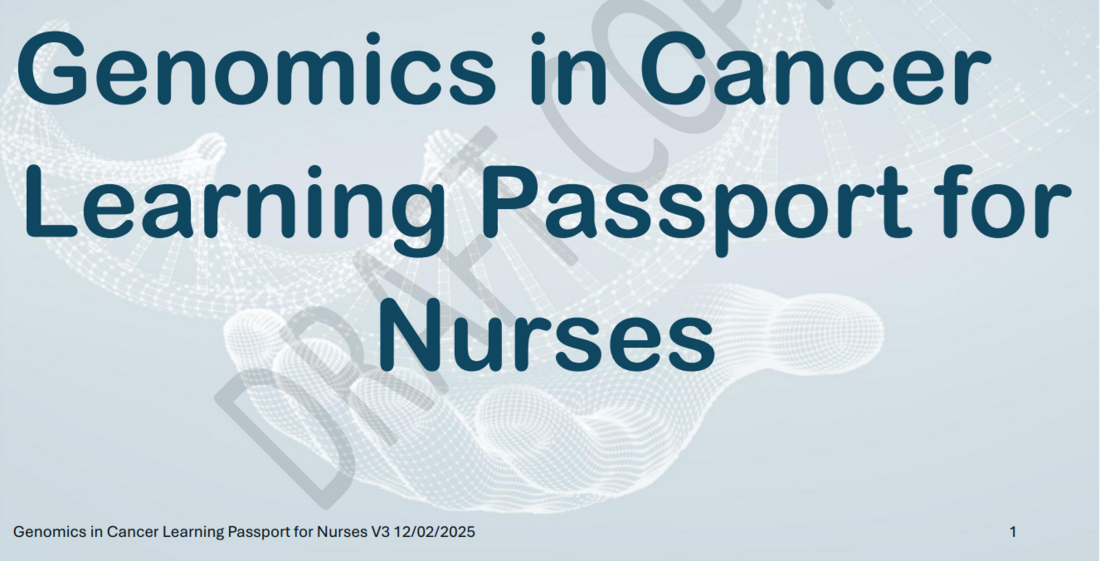Continued advances within genomics and the application of genomic technologies, has resulted in developments in diagnosis, treatment and care management, as well as broadened the cope for research to enable an enhanced understanding and cancer care for patients.
As healthcare professionals working within cancer care it's vital that there is an understanding of the impact of genomics so that patients are informed, and involved in treatment decisions in relation to their ongoing care needs.
The Alliance is co-lead for the national Circulating tumour biomarker Genomic Network of Excellence, and has recently been involved in the national lung cancer and Lynch Syndrome genetic testing pathway projects.
There is a wealth of education, training and professional development mateials available.
On this page, we share information and links to the Clinical Genetics Services in the North West, as well as two national organisations and resources; Macmillan Cancer Support, GatewayC and Genomic Education Programme's GeNotes, who provide healthcare professionals with up-to-date resources, tools, information, and training courses to help them to support people living with cancer.
NWGLH Genomic Resource - Cancer
Genomic testing is delivered through a national network of seven Genomic Laboratory Hubs (GLHs) across England, each is responsible for coordinating testing within their geographical region.
The NHS North West Genomics Laboratory Hub (NWGLH) is led by Manchester University NHS Foundation Trust with laboratory sites at Manchester and Liverpool and includes other delivery partners across the region.
The NWGLH provide all genomic testing for cancer patients across the North West region including DNA panel testing, RNA sequencing, FISH tests, DPYD testing and whole genome sequencing (where applicable).
For some specialist tests, samples may be forwarded onto other GLHs, but this will not affect the referral process or the return of results.
The leaflet shared above has been developed and shared by the NWGLH, in addition to a General Genomic Resource Leaflet available via clicking on the link.
For more information please visit: https://mft.nhs.uk/nwglh/
Updated July 2025
Genomics Education Programme
What is ctDNA?
https://www.genomicseducation.hee.nhs.uk/education/videos/what-is-ctdna/
ctDNA for cancer patients
Circulating DNA as a biomarker for cancer diagnostics
https://www.mimslearning.co.uk/courses/circulating-dna-as-a-biomarker-for-cancer-diagnostics
Plasma EGFR mutation tests for adults with locally advanced or metastatic non-small-cell lung cancer
Roche ctDNA series
Introduction to ctDNA
https://www.youtube.com/watch?v=OKQGSuOuPkY
Methods for ctDNA detection and analysis
https://www.youtube.com/watch?v=pwK1BTlQl6w
Tissue Biopsy vs liquid biopsy
https://www.youtube.com/watch?v=ZoFQD2U8vxg
Clinical applications of liquid biopsies in NSCLC
https://www.youtube.com/watch?v=_SWH7wn0RIY
eight-part series on liquid biopsy titled, “Utility of Cell-free DNA in the Clinic: Current State and Future Directions
https://educate.amp.org/local/catalog/view/product.php?productid=474
ctDNA Podcasts Episodes 1-5
What is a liquid Biopsy (NHS Genomic Medicine Service)
https://www.youtube.com/watch?v=wvPtnOsLp7w
Liquid Biopsy Biomarker Test Report: walkthrough video
https://www.youtube.com/watch?v=KcF0GD7vLCM
ctDNA ESR1 breast cancer animation
https://www.youtube.com/watch?v=RmOGJbbou60
ESR1 breast ctdna testing educational session (NT)
https://norththamesgenomics.nhs.uk/resources/esr1-breast-ctdna-testing-education-session/
ESR1 breast ctdna testing educational session (NW)
https://www.youtube.com/watch?v=OFvdVTYLW9U
Educational Video for interpretation of results report
https://norththamesgenomics.nhs.uk/resources/esr1-breast-ctdna-testing-education-session/
GeNotes provides a wide range of information in relation to oncology and cancer care, via their 'In the Clinic' and 'Knowledge Hub' areas.
In the Clinic
Focused on the point of patient care, these short scenarios look at when to consider genomic testing and what you need to do.
Knowledge Hub
Extend your learning with this encyclopaedia of resources, designed to support your understanding of genomics in medicine.
In the North West, there are multidisciplinary team of doctors, genetic counsellors and clinical scientists provide support to individuals, both adults and children, affected by or at risk of genetic disorders, based at Liverpool Women's Hospital and Manchester University Foundation NHS Trust.
Services include diagnosis:
- Diagnosis of genetic disorders
- Risk assessment and genetic counselling for patients with a family history of an inherited disorder or a family cancer syndrome
- Predictive genetic testing including prenatal diagnosis for some genetic disorders
Liverpool Centre for Genomic Medicine (LCGM)
Liverpool Women’s provides a regional genetics service known as the Merseyside and Cheshire Genetics Service - serving the population across Merseyside, Cheshire and the Isle of Man.
The Genetic Laboratory Service based at the Liverpool Women's Hospital site is now part of Manchester University NHS Foundation Trust, and the North West Genomic Laboratory Hub (NW GLH).
For further information please click here.
Manchester Centre for Genomic Medicine (MCGM)
Based within Manchester University NHS Foundation Trust , MCGM provides a regional genetics services, working with NW GLH and clinical colleagues from a variety of medical specialties, across Greater Manchester and the North West region.
For further information please click here.
For information regarding Clinical Genetics Referrals, please refer to the relevant pages below.
For Liverpool Clinical Genetics Referrals, please click here.
For Manchester Clinical Genetics Referrals, please click here.
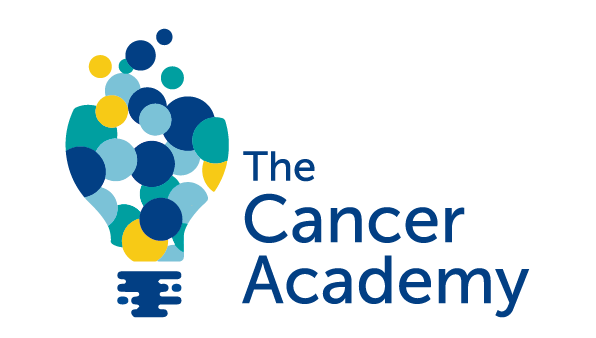 Cheshire & Merseyside Cancer Academy
Cheshire & Merseyside Cancer Academy
Cheshire & Merseyside Cancer Alliance brings together organisations, patients, and others affected by cancer to drive improvements in clinical outcomes and patients’ experience of the care and treatment they receive. The Alliance is responsible for cancer performance, quality, and outcomes across Cheshire and Merseyside and works collaboratively with NHS colleagues and partners within the third sector to champion and enable new approaches to delivering cancer services.
The Cheshire and Mersey Cancer Academy, an integral component of the Cheshire and Merseyside Cancer Alliance, is dedicated to empowering healthcare professionals through exceptional training and education in cancer care. By offering a comprehensive suite of resources and courses, the Academy ensures that practitioners across primary, secondary, and tertiary care settings are equipped with the latest knowledge and skills to deliver high-quality, patient-centred care.
One of the Academy's flagship offerings is the Principles of Cancer Care Programme (PCCP), a four-day online course tailored for healthcare staff in supportive or assistive roles who work with individuals affected by cancer or those with potential cancer diagnoses. This program provides a solid foundation in cancer care principles, enhancing participants' confidence and competence in their roles.
In addition to structured courses, the Academy provides a wealth of resources aimed at specific tumour sites, including breast, colorectal, and urology cancers. These resources encompass the latest education, training, and guidelines, enabling healthcare professionals to stay abreast of advancements and best practices in oncology.
Recognizing the importance of addressing health inequalities, the Academy has introduced the 123 Approach to Health Inequalities and Patient Experience (HIPE). This initiative offers training designed to empower healthcare providers to tackle disparities in cancer care, ensuring equitable treatment outcomes across diverse patient populations.
Furthermore, the Academy supports the implementation of the Aspirant Cancer Career and Education Development (ACCEND) framework, which outlines the knowledge, skills, and capabilities required by nurses and allied health professionals in both general and specialist cancer services. By providing self-assessment tools and comprehensive guides, the Academy facilitates the professional development of the cancer care workforce.
For more information on cancer care education and training resources available, please visit the Alliance's Cancer Academy at https://www.canceracademy.nhs.uk/learning/genomics-general/
 Greater Manchester Cancer Academy
Greater Manchester Cancer Academy
The Greater Manchester Cancer Academy, operating under the Greater Manchester Cancer Alliance, is dedicated to advancing cancer care by providing comprehensive education and training to healthcare professionals across various specialties. The Academy offers award-winning online cancer education across more than 20 specialties, ensuring that practitioners are well-equipped to deliver high-quality, patient-centered care.
A key initiative of the Academy is the development of specialised Cancer Academies, each tailored to specific cancer sub-specialties such as breast, colorectal, and lung cancers. These academies provide targeted educational resources, including CPD-accredited online modules, webinars, and hands-on skills labs, allowing healthcare professionals to deepen their expertise in particular areas of oncology.
The Academy reiterates the importance of effective communication in cancer care. In collaboration with Re:course AI, it has developed an advanced communication skills training package that utilises experiential AI-driven simulations. This innovative approach enables practitioners to engage in realistic patient and carer conversations within a safe environment, thereby enhancing their communication competencies.
To support the professional development of nurses and allied health professionals, the Academy aligns its educational offerings with the Aspirant Cancer Career and Education Development (ACCEND) framework. This alignment ensures that the training provided meets the required knowledge, skills, and capabilities for delivering exceptional cancer care. The Academy's ePortfolio platform further facilitates this development by allowing practitioners to log their learning achievements and track their progress.
By offering these comprehensive services and support, the Greater Manchester Cancer Academy plays a pivotal role in enhancing the proficiency of healthcare professionals. This commitment not only elevates the standard of cancer care within the region but also contributes to improved patient outcomes and experiences.
The academy have recently developed a series of animated videos whose primary purpose is to support patient understanding of how genomics is used in cancer care and to spark conversations with their lead healthcare professionals. The animations were developed with the support of the academy's PPIE group.
For more information on the range of support available, please visit: https://www.gmcanceracademy.org.uk/
Macmillan cancer support
The Macmillan Genomics Toolkit is designed to guide healthcare professionals to multiple education resources, pathway guidelines, clinical documents, patient support information and case studies to demonstrate the ‘Gold Standard’ of care once genomics has been embedded into practice. 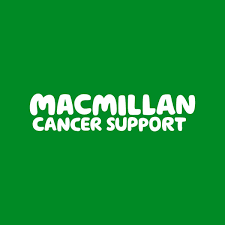
Genomics is rapidly becoming an integral part of cancer care and its clinical significance will only increase in time, transitioning into a central pillar of routine cancer treatment and prevention. Macmillan understands the importance of supporting both those living with and beyond cancer, but also the people who make that happen: the healthcare professionals.
Please click on the block below to view links to the toolkits.
https://www.macmillan.org.uk/healthcare-professionals/innovation-in-cancer-care/genomics-toolkit
Breast cancer toolkit
Colorectal cancer toolkit
Gynaecological cancer toolkit
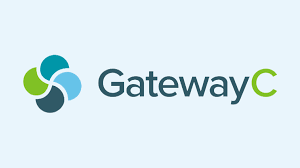 GatewayC
GatewayC
GatewayC an online cancer education platform for primary care, designed to improve cancer outcomes by facilitating earlier and faster diagnosis and improve patient experience.
The educational content supports healthcare professionals to:
- Improve knowledge of red flag symptoms
- Increase confidence in when and not to refer a patient on a suspected cancer referral
- Improve quality of suspected cancer referrals, reducing delays in the system
- Improve communication to support patients throughout diagnosis
GatewayC offer a comprehensive range of courses which we have shared a selection in the block below.
GatewayC provide accessible, innovative and tailored information and support resources at https://www.gatewayc.org.uk/
Below are a selection from the range of courses available: 
Brain Tumour
https://www.gatewayc.org.uk/courses/brain-tumour/
Breast cancer recurrence
https://www.gatewayc.org.uk/courses/breast-cancer-recurrence/
Cervical cancer
https://www.gatewayc.org.uk/courses/cervical-cancer/
Colorectal cancer
https://www.gatewayc.org.uk/courses/colorectal-cancer/
Head and neck cancer
https://www.gatewayc.org.uk/courses/head-and-neck-cancer/
Lung Cancer
https://www.gatewayc.org.uk/courses/lung-cancer/
Ovarian Cancer
https://www.gatewayc.org.uk/courses/ovarian-cancer/
Pancreatic Cancer
https://www.gatewayc.org.uk/courses/pancreatic-cancer/
Prostate Cancer
Genomics education programme (GEP)
In 2014, Health Education England (HEE) launched a four-year £20 million Genomics Education Programme (GEP) to ensure that our 1.2 million-strong NHS workforce has the knowledge, skills and experience to keep the UK at the heart of the genomics revolution in healthcare.
Funding for the programme has since been extended to enable us to continue our work in provid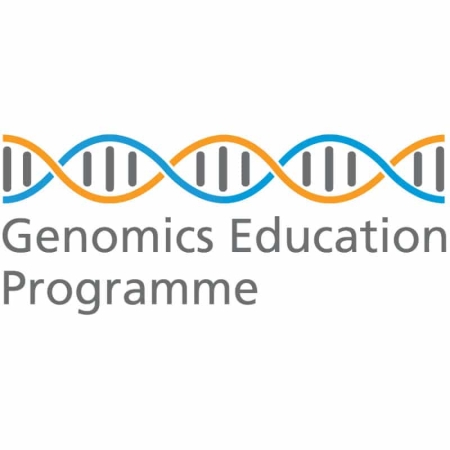 ing co-ordinated national direction of education and training in genomics and developing resources for a wide range of professionals.
ing co-ordinated national direction of education and training in genomics and developing resources for a wide range of professionals.
The GEP’s objectives are:
- Prepare the workforce to deliver the new England-wide NHS Genomic Medicine Service.
- Support the completion of the landmark 100,000 Genomes Project.
- Provide the best education opportunities in genomics for the NHS workforce.
- Develop strategic collaborations to keep the UK at the forefront of genomics in healthcare.
Each of the GMSAs across England have a dedicated Workforce education and training lead; each working colalboratively in relation to the generation of new, relevant and informative education and training resources for healthcare professionals across England. An example of which are the new series of 'From biopsy to personalised cancer care' webinars and associated 'Genomics Bites' education and training modules.
For more information please visit https://www.genomicseducation.hee.nhs.uk/genomics-in-healthcare/
In relation to cancer care, then visit this section within the GEP website: https://www.genomicseducation.hee.nhs.uk/genomics-in-healthcare/genomics-in-oncology/
There are also a wide range of materials available within the GeNotes section of the Genomics Education Programme website (more information and links available below).

